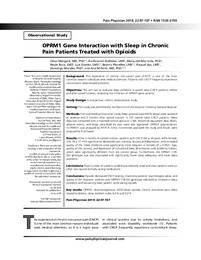Título :
OPRM1 Gene Interaction with Sleep in Chronic Pain Patients Treated with Opioids |
Autor :
Margarit, César
Ballester, Pura 
Inda, María del Mar
Roca, Reyes
Gomez, Luis 
Planelles, Beatriz
Ajo Ferrer, Raquel 
Morales, Domingo 
Peiró, Ana  |
Editor :
Paducah, Ky. : American Society of Interventional Pain Physicians |
Departamento:
Departamentos de la UMH::Farmacología, Pediatría y Química Orgánica |
Fecha de publicación:
2019-01 |
URI :
https://hdl.handle.net/11000/32361 |
Resumen :
Background: The experience of chronic non-cancer pain (CNCP) is one of the most
common reasons individuals seek medical attention. Patients with CNCP frequently experience
concomitant sleep-related problems.
Objectives: The aim was to evaluate sleep problems in opioid naïve CNCP patients, before
and after opioid titration, analyzing the influence of OPRM1 gene variants.
Study Design: A prospective, cohort, observational study.
Setting: This study was performed at the Pain Unit of the Alicante University General Hospital.
Methods: Pain and Medical Outcomes Study Sleep questionnaire (MOS-Sleep) were assessed
at baseline and 3 months after opioid titration in 231 opioid naïve CNCP patients. Sleep
data was compared with a matched-control group (n = 64). Morphine equivalent daily doses,
adverse events, and drugs prescribed for pain were also registered. OPRM1 polymorphism
rs1799971 was analyzed by RT-PCR. Ethics Committee approved the study and results were
analyzed by R software.
Results: After 3 months of opioid titration, patients with CNCP (63 ± 14 years, 64% female,
VAS 74 ± 17 mm) significantly decreased pain intensity, anxiety and depression, and increased
quality of life. Sleep problems were significantly more frequent in females (P = 0.002). Age,
quality of life, anxiety, and depression all influenced sleep disturbances and problems indices,
which were significantly different from the control group. Furthermore, the OPRM1 118-
GG genotype was also associated with significantly lower sleep adequacy, and more sleep
problems.
Limitations: Total number of subjects studied was relatively small and most patients were on
other non-opioid centrally-acting medications.
Conclusions: Opioids decreased CNCP severity, improving patients’ psychological areas, and
quality of life. However, patients with OPRM1 118-GG genotype indicated an increase in sleep
problems and worsening sleep pattern while taking opioids.
|
Palabras clave/Materias:
OPRM1
pharmacogenetics
MOS-Sleep
opioids
chronic noncancer pain
sleep related problems
sleep problem index SLP-6 and SLP-9 |
Área de conocimiento :
CDU: Ciencias aplicadas: Medicina: Farmacología. Terapéutica. Toxicología. Radiología |
Tipo de documento :
info:eu-repo/semantics/article |
Derechos de acceso:
info:eu-repo/semantics/openAccess |
Publicado en:
Pain Physician. 2019 Jan;22(1):97-107 |
Aparece en las colecciones:
Artículos Farmacología, Pediatría y Química Orgánica
|
 La licencia se describe como: Atribución-NonComercial-NoDerivada 4.0 Internacional.
La licencia se describe como: Atribución-NonComercial-NoDerivada 4.0 Internacional.
.png)
